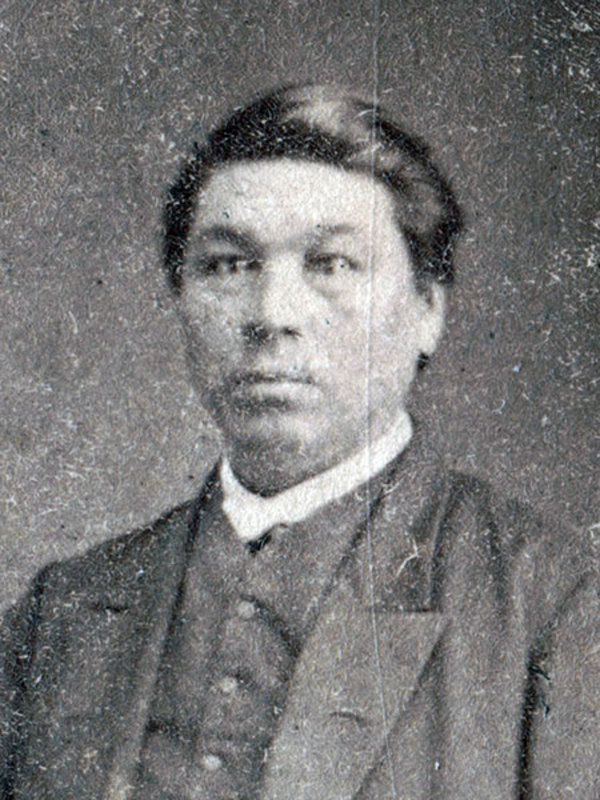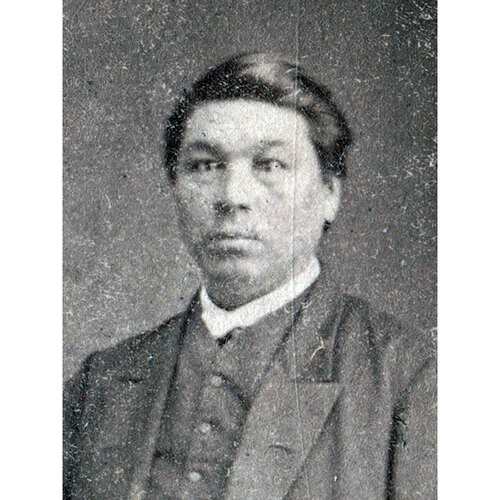
Source: Link
COCHRANE, HENRY, schoolmaster, Church of England minister, and Cree interpreter and translator; b. c. 1834 in the Indian Settlement (Dynevor, Man.); m. first 13 Oct. 1859 Mary Gowler, and they had two children; m. secondly 23 June 1863 Elizabeth Jane Budd; d. 22 May 1898 at Jackhead, Man.
The son of Cree Indians, Henry Cochrane was educated, probably by catechist Joseph Cook, in the Indian Settlement, also known as St Peter’s parish, for a career as a schoolmaster and interpreter. In July 1854 he was the Church Missionary Society’s schoolmaster at Moose Lake, and from 1855 to 1859 he taught at Fort Alexander. He must have continued his studies, however, for on 26 May 1858 he was examined as a candidate for ordination; on 1 Aug. 1858 he was ordained deacon and on 27 Dec. 1859 he was priested. Associated with the CMS through most of his career, he began by assisting the Reverend Abraham Cowley* at the Indian Settlement from 1859 to 1864. He then took over Holy Trinity parish at Headingley in the wake of disruptions there which pitted English-speaking mixed-bloods against Métis. In September 1866 he was appointed native pastor of the Indian Settlement; he preached frequently in nearby European parishes as well. During the uprising at the Red River settlement in 1869–70 he did much to prevent the Indians from supporting Louis Riel*. In 1875 he assumed direction of the Devon mission (The Pas) from his father-in-law, the Reverend Henry Budd*, the first Indian ordained to the Church of England ministry.
After allegations of immorality and drunkenness were made against him, Cochrane resigned from his charge and from the CMS in August 1879 and taught school for the Indian Department. He taught at the Devon mission until 1880, when he returned to St Peter’s as schoolmaster. In 1892 he took on a small school of ten pupils on the Ebb and Flow Indian Reserve, and in 1894 he moved to Hungry Hall School in the Couchiching agency near Rainy Lake (Couchiching Island Indian Reserve, Ont.). In 1895 or 1896 he moved to Fairford, Man., where he worked with the Reverend George Bruce until his death in 1898. He was reinterred at St Peter’s cemetery on 20 Feb. 1899.
Cochrane’s life was marked by tragedy and pain. His first wife, a white woman, died only two years after their marriage. In 1867 his son and daughter as well as his second wife’s brother died of fever. In 1875 Cochrane and his second wife arrived at the Devon mission just in time to tend her father in his last agonizing days. The second Mrs Cochrane was not strong and was subject to frequent spells of weakness and fainting. She found gossip surrounding her husband’s infidelity particularly difficult to endure.
Cochrane, along with Budd and James Settee*, was one of the “pure” Indian clergy in Rupert’s Land. The three were close, aware of their subordinate status as native clergy and the penury that it brought. Paid less than their European colleagues, they petitioned for equal status on at least one occasion. Nevertheless, a firm friendship existed between Cochrane and Cowley, the patriarchal white missionary, although Cochrane more than once strained it to the limit with his bouts of drinking. It was his problem with alcohol in particular that prompted his many moves and led to his ostracization by the Church of England.
Cochrane and his second wife translated the Bible, the Book of Common Prayer, and many hymns into Cree. Although they worked in syllabics, they were also convinced of the effectiveness of transliteration. Their material was sent to England for printing but there is no record of its publication. Cochrane’s educational efforts, which he felt were critical to the survival of the Indian in the west, were hampered by a lack of books and paper and by the seasonal migrations of the Wood Cree. He was an excellent teacher, winning substantial cash awards from the Department of Indian Affairs from 1886 to 1890. By all accounts, he was held in the highest esteem, although Indian Commissioner Edgar Dewdney* in a dispute with him over arrears in salary in 1880 urged Ottawa to pay the $330 because Cochrane was “such a vindictive man.” Cochrane was a witness to the signing of treaties nos.1 and 5. He served as interpreter at East Doghead Point, Berens River, Grand Rapids, and The Pas for the negotiation of Treaty No.5 and was paid $30. The esteem in which the Indians held him made his word critical in securing the adhesions.
Cochrane was a tragic figure on the fringes of the church, never fully accepted, and harbouring a silent bitterness. Yet he was motivated by a sincere Christianity, finding solace in his God, and perhaps too often in the bottle.
NA, RG 10, B3, black (western) ser. PAM, MG 2, C14; MG 7, B5, reg. of burials, no.456a; B7, reg. of marriages, 1854–82, no.46; B17, reg. of marriages, 1858–82; MG 12, A; B. Univ. of Birmingham Library, Special Coll. (Birmingham, Eng.), Church Missionary Soc. Arch., C, C.1/L.3, 1872; C.1/M.8, 1870–72; C.1/M.9, 1873; C.1/M.10, 1875; C.1/O; G, C.1/P.1, 1884. Henry Budd, The diary of the Reverend Henry Budd, 1870–1875, ed. Katherine Pettipas (Winnipeg, 1974). Can., Parl., Sessional papers, 1880–1900 (annual reports of the Dept. of Indian Affairs). J. J. Hargrave, Red River (Montreal, 1871; repr. Altona, Man., 1977). Canadian Churchman, 1898–99. Manitoba Morning Free Press, 4 June 1898. Saskatchewan Herald, 10 June 1898. T. C. B. Boon, The Anglican Church from the Bay to the Rockies: a history of the ecclesiastical province of Rupert’s Land and its dioceses from 1820 to 1950 (Toronto, 1962); “Henry Cochrane was honoured in his time,” Winnipeg Free Press, 7 Oct. 1967, Leisure Magazine: 17.
Cite This Article
Frits Pannekoek, “COCHRANE, HENRY,” in Dictionary of Canadian Biography, vol. 12, University of Toronto/Université Laval, 2003–, accessed December 31, 2025, https://www.biographi.ca/en/bio/cochrane_henry_12E.html.
The citation above shows the format for footnotes and endnotes according to the Chicago manual of style (16th edition). Information to be used in other citation formats:
| Permalink: | https://www.biographi.ca/en/bio/cochrane_henry_12E.html |
| Author of Article: | Frits Pannekoek |
| Title of Article: | COCHRANE, HENRY |
| Publication Name: | Dictionary of Canadian Biography, vol. 12 |
| Publisher: | University of Toronto/Université Laval |
| Year of publication: | 1990 |
| Year of revision: | 1990 |
| Access Date: | December 31, 2025 |



